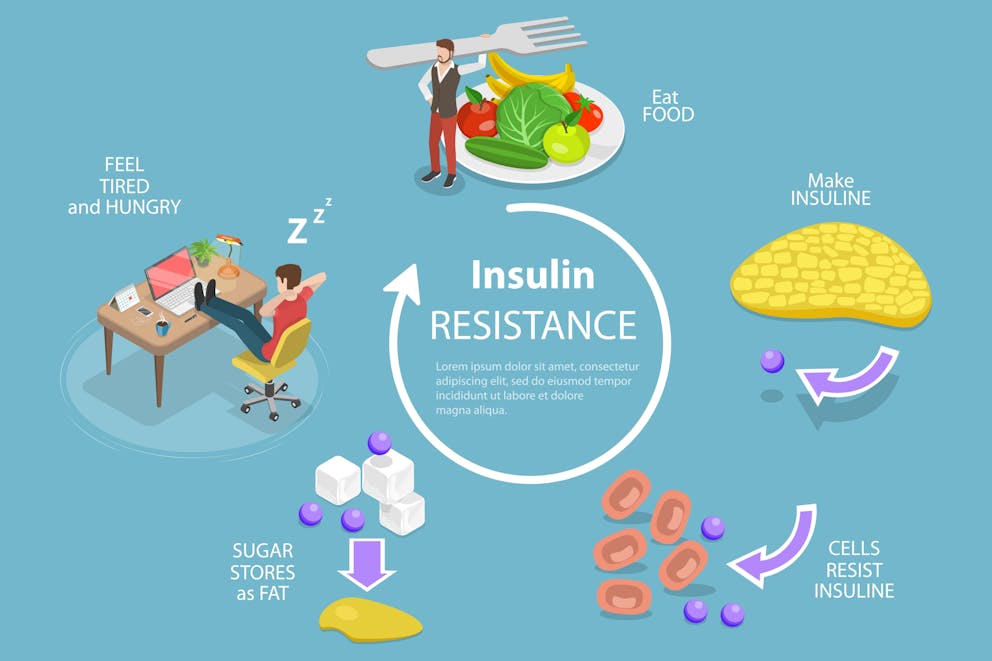The Actual Cause of Diabetes
Millions of people around the globe are living with diabetes, a condition that's as tricky as it is widespread.
But what exactly causes it? In this piece, we’re exploring the big role of tiny Insulin in balancing our blood sugars plus peeling back layers on what causes it to falter, cue insulin resistance, and potentially diabetes.
You'll discover how your diet, stress levels, and lifestyle choices impact your risk. Ready to be the boss of your own health journey? Let's dive in!
Understanding Diabetes and Insulin Resistance
Diabetes is a chronic condition that affects millions of people worldwide. It occurs when the body cannot properly regulate blood sugar levels, leading to a range of health complications.
To understand diabetes, it's essential to grasp the fundamental role of insulin in blood sugar regulation and the consequences of insulin resistance.
The Role of Insulin in Blood Sugar Regulation
Insulin is a hormone produced by the pancreas that plays a crucial role in regulating blood sugar levels. Eating carbohydrates?
Your body transforms them into glucose, which finds its path straight to your blood. In response, the pancreas releases insulin to help cells absorb glucose from the blood, providing them with energy.
However, when the body becomes resistant to insulin, this process is disrupted. Insulin resistance occurs when cells fail to respond properly to insulin, making it difficult for glucose to enter the cells.
As a result, glucose accumulates in the bloodstream, leading to high blood sugar levels.

Causes and Consequences of Insulin Resistance
Several factors can contribute to the development of insulin resistance, including obesity, physical inactivity, unhealthy dietary habits, and genetic predisposition.
When cells become resistant to insulin, the pancreas compensates by producing more insulin to maintain normal blood sugar levels.
Over time, the pancreas may struggle to keep up with the increased demand for insulin, leading to insulin deficiency.
This deficiency is the main cause of diabetes, resulting in persistently high blood sugar levels that can damage various organs and tissues in the body.
The consequences of insulin resistance and diabetes are far-reaching. Chronic high blood sugar levels can lead to complications such as cardiovascular disease, kidney damage, nerve damage, and vision problems.
Managing insulin resistance is crucial for preventing the onset of diabetes and its associated health risks.
Triggers of Insulin Secretion and Their Effects
While insulin resistance is a key factor in the development of diabetes, it's essential to understand the various triggers that stimulate insulin secretion.
Let's take a closer look at how different things impact our insulin—it could shed light on why some of us are hitting roadblocks with insulin resistance.
Impact of Diet on Insulin Production
The foods we eat have a significant impact on insulin production. When we consume carbohydrates, particularly refined carbohydrates like sugary drinks and processed snacks, our blood sugar levels rise rapidly.
In response, the pancreas releases a surge of insulin to help cells absorb the excess glucose.
Protein and amino acids can also stimulate insulin secretion, although to a lesser extent than carbohydrates. Interestingly, when protein is consumed alongside carbohydrates, the insulin response is almost doubled compared to consuming carbohydrates alone.
The Role of Stress and Hormones in Insulin Secretion
In addition to dietary factors, stress and other hormones can influence insulin secretion and blood sugar levels. During digestion, gastrointestinal hormones are released, which can nearly double the rate of insulin secretion.
This helps the body efficiently process and absorb nutrients from the food we eat. Funny enough, stress hormones like cortisol don't just mess with your mood; they also shake up insulin levels.
When we experience stress, cortisol is released, which can cause a temporary increase in blood sugar levels. Over time, chronic stress and elevated cortisol levels may contribute to insulin resistance and an increased risk of developing diabetes.
Understanding the various triggers of insulin secretion can help us make informed lifestyle choices to support healthy blood sugar regulation.
By being mindful of our diet, managing stress, and maintaining hormonal balance, we can take proactive steps to reduce the risk of insulin resistance and diabetes.
Managing Diabetes Through Lifestyle Changes
While diabetes is a serious condition, the good news is that lifestyle changes can play a significant role in managing the disease and reducing the risk of complications.
Tweaking what you eat, how much you move, and handling stress better can really put people with diabetes or those staring it down in the driver's seat of their health.
Dietary Strategies for Controlling Blood Sugar
Diet is a key component of diabetes management. Adopting a balanced and nutritious eating plan can help stabilize blood sugar levels and improve insulin sensitivity. Let's make it simple - eat more plants.
Fruits that burst with flavor in every bite; vegetables that crunch satisfyingly; grains that fill you up but good; and legumes—your new best friends packed with fiber.
Be savvy about eating carbohydrates; they're the biggest factor that swings your blood sugar levels up and down. Choosing complex carbohydrates with a low glycemic index, such as sweet potatoes and quinoa, can help prevent rapid spikes in blood sugar.
Here’s an interesting fact—embracing healthy fats found in things like avocados or almonds not only zests up meal times but also sharpens how well we handle sugar spikes. A real bonus point towards keeping fit.
Importance of Physical Activity
Regular physical activity is another crucial aspect of managing diabetes and improving insulin sensitivity. Exercise helps the body use insulin more effectively, allowing cells to absorb glucose from the bloodstream more efficiently.
Engaging in a combination of aerobic exercise, such as brisk walking or swimming, and strength training can provide significant benefits.
Aim to incorporate at least 150 minutes of moderate-intensity exercise per week, spread out over several days. Even small amounts of physical activity, such as taking short walks after meals, can help regulate blood sugar levels and improve overall health.
Stress Reduction Techniques
Managing stress is an often-overlooked aspect of diabetes management, but it plays a significant role in blood sugar regulation. Chronic stress can lead to elevated cortisol levels, which can contribute to insulin resistance and make it more challenging to control blood sugar.
Incorporating stress reduction techniques into daily life can help mitigate the impact of stress on diabetes. Practices such as deep breathing exercises, meditation, yoga, or engaging in hobbies that promote relaxation can be beneficial.
Additionally, seeking support from loved ones or a mental health professional can provide valuable tools for coping with stress.
By making informed dietary choices, prioritizing physical activity, and managing stress, individuals with diabetes can take proactive steps to improve their health and quality of life.
These lifestyle changes, along with regular monitoring and medical guidance, can help prevent complications and promote long-term well-being.
Preventing Diabetes Through Early Intervention
While managing diabetes is crucial for those already diagnosed, prevention is equally important. By identifying risk factors and making lifestyle changes early on, individuals can significantly reduce their chances of developing diabetes.
Early intervention is key to protecting long-term health and quality of life.
Identifying Pre-Diabetes and Taking Action
Pre-diabetes is a condition where blood sugar levels are higher than normal but not yet high enough to be diagnosed as diabetes. Recognizing the signs of pre-diabetes and taking prompt action can prevent the progression to full-blown diabetes.
Ever find yourself chugging water non-stop, darting off to pee every hour on the hour, battling constant tiredness or squinting more than normal? These might just be early warnings your body is edging toward pre-diabetes.
Feeling some odd symptoms? Add in risk factors such as being overweight, diabetes running in the family, or mostly sitting all day – and it’s probably wise to give your doctor a ring.
With their help, pinpointing where your glucose stands is just the start—they'll steer you towards better living choices too.
The Power of Informed Dietary Choices
Making informed dietary choices is a powerful tool in preventing diabetes. Adopting a proper diet that emphasizes whole, nutrient-dense foods can help regulate blood sugar levels and maintain a healthy weight.
Focus on incorporating a variety of fruits, vegetables, lean proteins, and healthy fats into your meals.
Also, it's smart to eat less junk food and sugary treats because they spike your blood sugar fast which might mess with your body's insulin use.
By making mindful food choices and practicing portion control, you can support your body's natural ability to regulate blood sugar and reduce the risk of developing diabetes.
Building a Physically Active Lifestyle
Regular physical activity is a key component of diabetes prevention. Dive into some daily exercise - it does wonders for improving how sensitive your body is to insulin while helping with weight management and reducing any likelihood of developing diabetes.
Aim high by mixing it up - add aerobics for that heart health and include strength sessions to build those muscles.
Find activities that you enjoy and can sustain long-term, such as brisk walking, cycling, swimming, or dancing. Start gradually and gradually increase the duration and intensity of your workouts over time.
Even small changes, like taking the stairs instead of the elevator or going for a short walk during your lunch break, can make a difference.
By identifying pre-diabetes early, making informed dietary choices, and building a physically active lifestyle, individuals can take proactive steps to prevent the onset of diabetes.
These lifestyle changes not only reduce the risk of diabetes but also promote overall health and well-being. Remember, it's never too late to start making positive changes for a healthier future.

Unveiling the Sweet Dilemma
In the complex landscape of diabetes and insulin resistance, understanding the role of fermented foods adds another layer of intrigue.
These foods, teeming with probiotics and beneficial bacteria, offer potential benefits for blood sugar regulation and overall health. However, their impact on individuals with diabetes or insulin resistance warrants careful consideration and exploration.
By delving into the fermented food conundrum, we can better tailor dietary choices to support optimal health outcomes.
Conclusion
Managing diabetes is all about understanding your body's relationship with insulin and blood sugar. Choosing the right foods, moving more, and chilling out can really ramp up your insulin sensitivity. Oh, and it'll boost your health big time too.
Remember, small changes can make a big difference. Swap out those sugary snacks for fiber-rich alternatives, take a brisk walk after meals, and find moments of calm in your day.
With a little knowledge and effort, you can take charge of your diabetes risk and feel your best.
So, what's one small step you can take today to support your blood sugar balance? Whether it's trying a new recipe or setting a reminder to move more, every action counts. Let's kick off your health improvement journey right now!
Previous blog
My Beef with What the Health DocumentaryNext blog
What Do Dry Burning Eyes Mean?
Popular
08/31/2023
11.6K views
08/31/2023
14.6K views
08/31/2023
145.3K views
03/18/2024
11/21/2022




